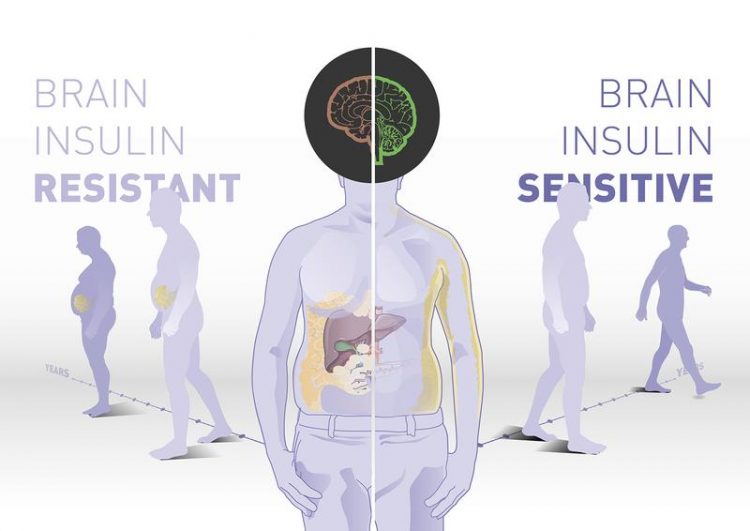Brain Insulin Sensitivity Determines Body Weight and Fat Distribution

Insulin action in the brain determines body weight, fat distribution and how to respond to lifestyle interventions. IDM, DZD
To which extent body fat has an unhealthy effect depends primarily on where it is stored. If fat accumulates in the abdomen, this is particularly unfavorable.
This is because the visceral fat releases numerous neurotransmitters that affect blood pressure, influence the secretion of the hormone insulin and can cause inflammation. This increases the risk of diabetes, cardiovascular disease and certain types of cancer. The subcutaneous fat which accumulates on the buttocks, thighs and hips has no adverse health effects.
However, it is still unclear why fat storage does not occur in the same place in all people. Studies in the Tübingen Lifestyle Intervention Program (TULIP) [1] suggest that brain insulin responsiveness could play an important role here.
They showed that people with a high insulin sensitivity in the brain benefit significantly more from a lifestyle intervention with a diet rich in fiber and exercise than people with insulin resistance in the brain. Not only did they lose more weight, they also had a healthier fat distribution.
But how does insulin sensitivity affect the distribution of body fat and weight in the long term? Researchers from the German Center for Diabetes Research (DZD), Helmholtz Zentrum München and Tübingen University Hospital investigated this question in a long-term study.
For this purpose, they recorded the follow-up data of 15 participants over a period of nine years, in which the insulin sensitivity in the brain was determined by magnetoencephalography before the start of a 24-month lifestyle intervention.
High insulin sensitivity associated with reduction in visceral fat and weight
It was found that insulin action in the brain not only determines body weight, but also the distribution of fat in the body.
“Subjects with high insulin sensitivity in the brain benefited from the lifestyle intervention with a pronounced reduction in weight and visceral fat. Even after the lifestyle intervention had ended, they only regained a small amount of fat during the nine-year follow-up,“ said the head of the study, Professor Martin Heni from Tübingen University Hospital.
In contrast, people with brain insulin resistance only showed a slight weight loss in the first nine months of the program. “Afterwards, their body weight and visceral fat increased again during the following months of lifestyle intervention,” said first author PD Dr. Stephanie Kullmann.
Since the insulin action in the hypothalamus is crucial for the regulation of peripheral energy metabolism, the researchers also investigated how insulin sensitivity in this area of the brain is related to the distribution of body fat. For this purpose, they examined a cross-sectional cohort of 112 participants. The analysis of the data showed that people with high insulin sensitivity in the hypothalamus form little visceral fat. However, insulin sensitivity has no influence on the mass of subcutaneous fat.
Our study reveals a novel key mechanism that regulates fat distribution in humans. Insulin sensitivity in the brain determines where fat is deposited, ”said Heni, summarizing the results.
Since visceral fat not only plays a role in the development of type 2 diabetes, but also increases the risk of cardiovascular disease and cancer, the study results may also open up new approaches for treatment options beyond metabolic diseases.
The researchers in Tübingen are already working on new therapies to abolish insulin resistance in the brain and thus have a beneficial effect on body fat distribution.
1) Tschritter, O. et al. High cerebral insulin sensitivity is associated with loss of body fat during lifestyle intervention. Diabetologia 55, 175–182 (2012).
Scientific contact:
Prof. Dr. med. Martin Heni
Tübingen University Hospital, Internal Medicine IV
Otfried Müller Straße 10
72076 Tübingen
Phone: +49 (0)7071 29-82714
Email: martin.heni(at)med.uni-tuebingen.de
Original publication:
Kullmann et al. (2020): Brain insulin sensitivity is linked to adiposity and body fat distribution. Nature Communications, DOI: doi.org/10.1038/s41467-020-15686-y
Media Contact
More Information:
http://www.dzd-ev.de/All latest news from the category: Life Sciences and Chemistry
Articles and reports from the Life Sciences and chemistry area deal with applied and basic research into modern biology, chemistry and human medicine.
Valuable information can be found on a range of life sciences fields including bacteriology, biochemistry, bionics, bioinformatics, biophysics, biotechnology, genetics, geobotany, human biology, marine biology, microbiology, molecular biology, cellular biology, zoology, bioinorganic chemistry, microchemistry and environmental chemistry.
Newest articles

Properties of new materials for microchips
… can now be measured well. Reseachers of Delft University of Technology demonstrated measuring performance properties of ultrathin silicon membranes. Making ever smaller and more powerful chips requires new ultrathin…

Floating solar’s potential
… to support sustainable development by addressing climate, water, and energy goals holistically. A new study published this week in Nature Energy raises the potential for floating solar photovoltaics (FPV)…

Skyrmions move at record speeds
… a step towards the computing of the future. An international research team led by scientists from the CNRS1 has discovered that the magnetic nanobubbles2 known as skyrmions can be…





















